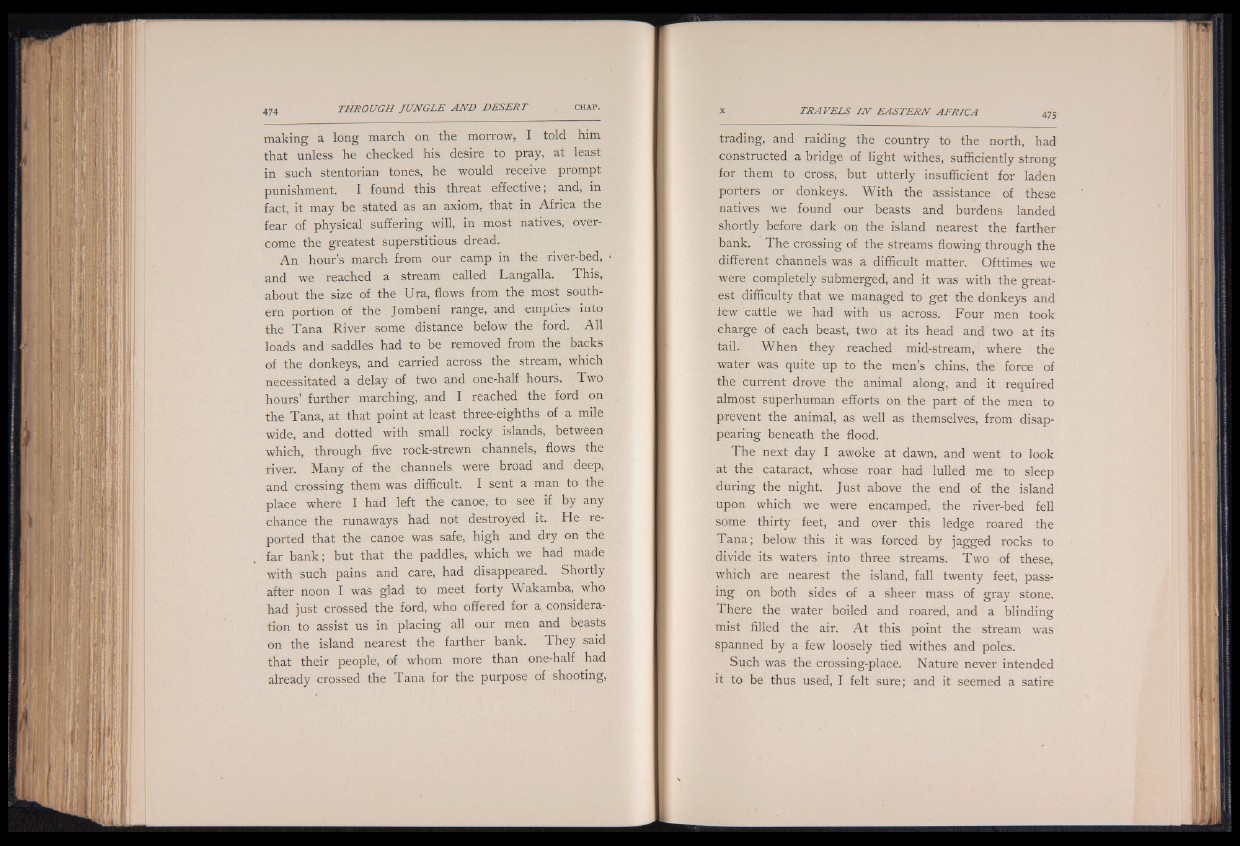
making a long march on the morrow, I told him
that unless he checked his desire to pray, at least
in such stentorian tones, he would receive prompt
punishment. I found this threat effective; and, in
fact, it may be stated as an axiom, that in Africa the
fear of physical suffering will, in most natives, overcome
the greatest superstitious dread.
An hour’s march from our camp in the river-bed, ‘
and we reached a stream called Langalla. This,
about the size of the Ura, flows from the most southern
portion of the Jombeni range, and empties into
the Tana River some distance below the ford. All
loads and saddles had to be removed from the backs
of the donkeys, and carried across the stream, which
necessitated a delay of two and one-half hours. Two
hours’ further marching, and I reached the ford on
the Tana, at that point at least three-eighths of a mile
wide, and dotted with small rocky islands, between
which, through five rock-strewn channels, flows the
river. Many of the channels were broad and deep,
and crossing them was difficult. I sent a man to the
place where I had left the canoe, to see if by any
chance the runaways had not destroyed it. He reported
that the canoe was safe, high and dry on the
far bank; but that the paddles, which we had made
with such pains and care, had disappeared. Shortly
after noon I was glad to meet forty Wakamba, who
had just crossed the ford, who offered for a. consideration
to assist us in placing all our men and beasts
on the island nearest the farther bank. They said
that their people, of whom more than one-half had
already crossed the Tana for the purpose of shooting,
trading, and raiding the country to the north, had
constructed a bridge of light withes, sufficiently strong
for them to cross, but utterly insufficient for laden
porters or donkeys. With the assistance of these
natives we found our beasts and burdens landed
shortly before dark on the island nearest the farther
bank. The crossing of the streams flowing through the
different channels was a difficult matter. Ofttimes we
were completely submerged, and it was with the greatest
difficulty that we managed to get the donkeys and
few cattle we had with us across. Four men took
charge of each beast, two at its head and two at its
tail. When they reached mid-stream, where the
water was quite up to the men’s chins, the force of
the current drove the animal along, and it required
almost superhuman efforts on the part of the men to
prevent the animal, as well as themselves, from disappearing
beneath the flood.
The next day I awoke at dawn, and went to look
at the cataract, whose roar had lulled me to sleep
during the night. Just above the end of the island
upon which we were encamped, the river-bed fell
some thirty feet, and over this ledge roared the
Tana; below this it was forced by jagged rocks to
divide its waters into three streams. Two of these,
which are nearest the island, fall twenty feet, passing
on both sides of a sheer mass of gray stone.
There the water boiled and roared, and a blinding
mist filled the air. A t this point the stream was
spanned by a few loosely tied withes and poles.
Such was the crossing-place. Nature never intended
it to be thus used, I felt sure; and it seemed a satire